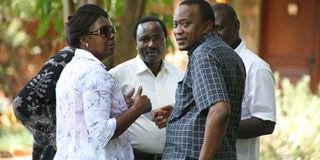Coalition bonding talks collapse

Vice-President Kalonzo Musyoka (centre) with Cabinet ministers Charity Ngilu, Uhuru Kenyatta and William Ruto after the meeting. Photo/HEZRON NJOROGE
Sharp political differences, suspicion and grandstanding and vested interests Saturday led to the collapse of a meeting of political bigwigs called to discuss the management of the Grand Coalition Government.
Two Cabinet ministers — Mutula Kilonzo and Noah Wekesa — were ejected from the heated meeting before it ended in disarray after the ODM side complained that they should not have attended the exclusive forum in the first place.
The coalition management team chaired by President Kibaki and Prime Minister Raila Odinga was unable to agree on the agenda of a meeting whose purpose was to agree on a timeline for reforms to be carried out in the second year of the political marriage.
So sharp were the differences that the President and the Prime Minister addressed separate and divergent news conferences in Kilaguni and Nairobi at the end of what was supposed to have been a bonding retreat to promote cohesion in government and Kenya.
“We did not storm out of the meeting; it simply did not take off,” Mr Odinga told reporters in Nairobi. “Unfortunately we were unable to agree on anything and, therefore, the meeting collapsed.” He said ODM party members would be consulted to determine a course of action.
The President and the PNU members called a press conference at 4.30p.m, an hour after the ODM team had left, and told journalists the two sides had held important consultations.
“They have helped members to see and hear different opinions,” the President said. “The consultations will continue in future meetings to foster understanding amongst members. As we do so, we will fast-track reforms, the constitutional review and the development agenda to address the many challenges facing the country. The challenges include drought and famine as well as unemployment among our people.”
He did not touch on issues that caused differences in the gathering. The aborted meeting came just days after a conference convened in Geneva by chief mediator Kofi Annan to discuss the state of the coalition and the future of Kenya. For different reasons, neither the President nor the PM went to Geneva.
This weekend, Kenya’s top political leaders were supposed to establish an agenda for the meeting at Kilaguni Lodge, but sharp differences emerged immediately, scuttling the much-publicised and anticipated dialogue. The Sunday Nation learnt that the mood in the meeting was so tense that neither Mr Kibaki nor Mr Odinga were able to make their opening remarks.
“The problem is that the meeting was set before agreeing on the agenda,” Mr Kilonzo said after his ejection from the meeting attended by 12 Cabinet ministers. “They (members) are talking, but there are issues. Consultations are going on.”
ODM and PNU coalition members spent the better part of yesterday locked in separate meetings following the standoff. Instead of leaving Saturday’s meeting more united, the grand coalition hierarchy left the talks more divided than ever.
President Kibaki was flanked by ministers Uhuru Kenyatta, Chirau Mwakwere, Moses Wetang’ula, George Saitoti and Vice-President Kalonzo Musyoka, while ministers James Orengo, Charity Ngilu, Mohamed Elmi, William Ruto and Jefferson Kingi accompanied Mr Odinga.
Deputy Prime Minister Musalia Mudavadi, who is a member of the team, and Justice minister Martha Karua, who declined her appointment to the committee, did not attend. The hardening of positions is seen to stem from the exercise of power in the coalition government; ODM seeks more power, but PNU refuses to give up any.
The Cabinet’s Coalition Management Committee -- which has met thrice since its inception in January -- was set up as ODM lieutenants went on the warpath against Francis Muthaura, Head of Public Service and Cabinet Secretary, whom they accused of usurping the powers and functions of the PM. Mr Muthaura attended the Kilaguni meeting.
A major bone of contention is the hiring and firing of public officials. Just this week, Mr Odinga said the government would initiate the process of removing Chief Justice Evan Gicheru and Police Commissioner Hussein Ali. But two days later, the President said that Mr Justice Gicheru had his full confidence.
The meeting rekindled the bitter rivalry between ODM and PNU reminiscent of the time prior to the signing of the National Accord in February 2008 that ended two months of post-election violence.
While ODM wanted the gathering to address a number of issues, the PNU participants mainly wanted it to discuss President Kibaki’s and Mr Odinga’s opening remarks and to be a basis for bonding.
The two principals led their allies to the Tsavo National Park lodge on Friday evening where the duo and Mr Musyoka held a private meeting before joining everyone for dinner. Items for discussion on an earlier agenda from PNU included options of implementing the Waki report, review of implementation of the National Accord, and image-building for the coalition.
ODM wanted to discuss management of the grand coalition, membership of the management committee, decision-making and government communication, appointments in government and protocol.
Other items on the ODM agenda were security organs, implementation of the National Accord, coalition agreement, the report of Prof Philip Alston on extrajudicial killings and fast-tracking of the implementation of Item 4 on the agenda of the National Dialogue and Reconciliation Committee.
ODM ministers further wanted a communications strategy for coalition developed, saying that some statements by government spokesman Alfred Mutua did not represent their party’s positions. They also wanted to push for more consultation with ODM on government appointments by President Kibaki and for Mr Odinga’s status as equal partner in the grand coalition to be recognised including through protocol.
But Mr Mwakwere was reported to have led the PNU in defending the coalition leadership insisting all was well. A source on the PM’s side said he had wanted to use the meeting to address the credibility crisis facing the grand coalition.




